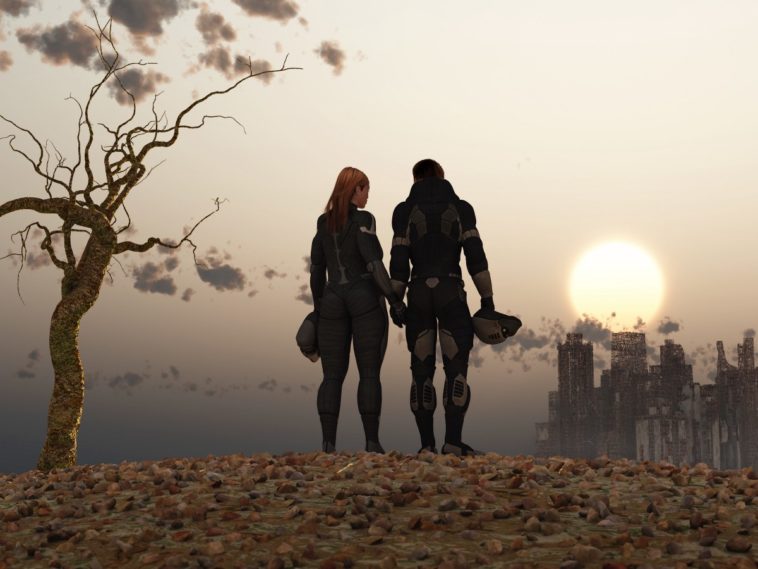h2>Dating : Stolen Memories
An educational sci-fi story about evolutionary neural behavior and post-apocalyptic prison breaks.
Science Fictioned is a series of science fiction and fantasy stories based on scientific research papers. Each article starts by explaining the science behind the paper in normal-person terms, followed by a short science fiction or fantasy story based on the science.
The content in this article is based on the following paper:
Radvansky, G. A., Krawietz, S. A., & Tamplin, A. K. (2011). Walking through doorways causes forgetting: Further explorations. The Quarterly Journal of Experimental Psychology, 64(8), 1632–1645.
Have you ever walked into a room to get something, only to immediately forget why you went in there? If this happens to you frequently, don’t worry — you’re not crazy. It turns out your brain is wired to do this on purpose.
Scientists have studied this idea for some time now, and have come up with some interesting theories to describe what’s going on.
The human brain is a big spongy mass of gray goo all connected together with little electrical connections. Current brain research tells us that there are 15–30 billion neurons that make up a brain. Each of these neurons is wired up to thousands of its neuron counterparts. When scientists have to deal with something that complicated, they don’t bother trying to understand how each piece works. Instead, they develop a simplified model, which is often quite good enough to get on with. You use models all the time, whether you realize it or not.
For example, consider a light switch.
When you turn on a light switch, a thin sliver of metal is moved around a pivot that connects to other pieces of metal. This connection allows a current of electricity to flow through the wires that run between the switch and the light fixture. That electrical current is generated at some far-away power plant. This is most likely accomplished by burning a fossil fuel, which heats water until it phase-shifts into steam. The rising steam spins a turbine, which is connected to an electromagnetic generator. The generator produces an electrical current that passes through various transformers on its way to your house. As complicated as that sounds, even that isn’t the whole story.
Unless you’re a technician working on the power grid, you probably don’t think about any of that when you stumble bleary-eyed into the kitchen first thing in the morning. The “model” most of us use for how the electrical system works is considerably simplified: flip switch—light turns on.
The thing to remember about models is that they’re always wrong — at least a little bit. Scientists know this, so they’re always trying to come up with new experiments to refine their models and make them better.
Our simplified light switch model works perfectly most of the time. But eventually there will come a day when we’ll discover our model is wrong; we turn on the switch and the light doesn’t come on. Now we have to refine our model to include the fact that there’s a filament in a light bulb that might be burned out, and a circuit breaker in our basement that might be tripped, or a power line outside that might be knocked out by a storm.
This is how science works. We build models to help make sense of what we see happen in response to certain events. When we find cases where our model doesn’t explain what’s going on, we devise experiments to make the model better.
According to one model of how our brains work, our thoughts and memories get grouped together into events and those events are associated with contexts.
For example, when we’re in the kitchen context, our thoughts might be engrossed by some recipe we’re working on. When we step into the living room context and a movie is playing, those recipe thoughts get shifted into the back of our minds in order to make room for the thoughts we need to understand what is happening in the movie.
Scientists at the University of Notre Dame discovered that when we pass through a doorway, it triggers one of these “context shifts”, causing our brain to file away memories from the previous room in order to provide space for the thoughts we need to survive in the new room. They also found that just walking across a large room did not have the same memory effect that passing through a doorway between two smaller rooms did.
Scientists believe that this is an evolutionary trait designed to enhance our chances of survival when we step out of “save cave zone” into “tiger-infested jungle zone”.
This idea of shifting memories made me wonder what would happen if someone could choose to shift a group of memories out of the way to make room for other memories. Even more interesting, what would happen if you could use this technique to exchange a group of memories with someone else?
The cold, night air cut like icy daggers through the prisoner uniform Catherine wore as she crouched atop the narrow window ledge above the deserted alleyway. She scanned the streets of the ruined city, looking for movement. There was a full moon tonight, but thankfully it was cloudy enough that the moonlight wouldn’t betray her. Something cried out in the distance, thought Catherine couldn’t be sure if it was human or not.
She held her breath as two creatures that were no longer men passed directly below her. Thankfully, only trappers had been sent after her. She wouldn’t have been able to avoid a coordinator by hiding on a grimy window ledge, but the day she couldn’t outrun a pair of mindless trappers would be the day she was ready for the final blackness.
If these two were following standard trapper procedure, they would continue along the street to the next intersection, then head left, completing the search pattern they’d been following all night.
The silent creatures shuffled down the narrow street, their jet-black clothing seemed to blend into the darkness completely. If it weren’t for their chalky white skin, Catherine would have had a hard time seeing them — even from this distance.
She tensed as they paused at the end of the alleyway, then relaxed as they turned left and resumed their eerie shuffle down a dimly-lit side street. Catherine counted to ten before dropping down to the deserted alleyway, then darted back the way the trappers had come, back towards the Facility—back towards Glen.
Running towards the Facility, after having just escaped. It sounded like madness, even now. But if what she had learned was true — if Glen was still alive, then what choice did she have?
To think he’d been right there, right there, and she’d had no idea. She should have—no, she couldn’t blame herself. There was no way she could have known that Glen was being held in the same Facility. If she hadn’t come across that guard…she repressed a shudder, trying not to think how close she had come to losing Glen’s trail.
She crept further along the street, keeping to the inky shadows cast by the crumbling hulks of twisted metal and broken glass that the elders said used to be filled with thousands upon thousands of humans. Catherine couldn’t wrap her mind around the idea. So many humans—real humans, alive and living together in safety and peace. What must it have been like?
She shook her head, this was no time for daydreaming. The only sounds she could hear as she moved through the street was the sound of her own breathing, unless you counted the beating of her heart, which was the only sound a coordinator would listen for.
Catherine knew from the information she’d shifted from the guard outside her cell that there should be one more pair of trappers coming exactly five minutes behind the first. She quickened her step, wanting to reach the drain before they caught up to her.
She could probably evade the second pair just as easily as she had the first, but there was always a chance they would spot her, and then…she fought back the fear that threatened to overwhelm her. She couldn’t think about what would happen if they caught her again—what they’d make her do. She had to get to Glen.
Catherine breathed a sigh of relief as she reached the pile of trash containers obscuring the opening to the drainpipe. The stench from the refuse made her want to retch. She tried not to think about what might be in those containers, or how long they’d been sitting there. As she slid into the tight space between the grungy brick wall and the containers, she heard the faint sound of shuffling footsteps coming from the far end of the street.
“Right on time,” she muttered, sliding the rest of the way into the slimy drainpipe. Her instincts told her to run, to get as far down that pipe as she could before the trappers passed too close. But she knew the pipe would amplify any noises she made. Trappers weren’t very clever, but they had excellent senses.
She smiled wryly to herself as she remembered the stories her friends used to tell about the Syndicate trappers back in the camps. How they could track anyone, find anyone just by thinking of their name. The stories said that no one could hide from a trapper for long. If all the stories she’d been told were true, there’d be no humans left to tell them.
Trappers were actually easy to avoid, as long as you knew the protocols they were bred to follow. Catherine had shifted the details of those protocols from a Syndicate scientist a few years ago, just before the man had died. It had been close—shifting the memory of the dying was always risky—but the risk had been worth it. The information had saved her life countless times.
The trappers shifted past the tunnel entrance without pause. As repulsive as the pipe smelled, Catherine knew it would mask her scent well. She waited a few seconds as the trappers continued up the street, following the same circuit as the first group. Once they’d passed out of sight, she slowly turned and began inching her way along the dark tunnel.



